9 Best Ways To Find Vintage Axes (with tips)
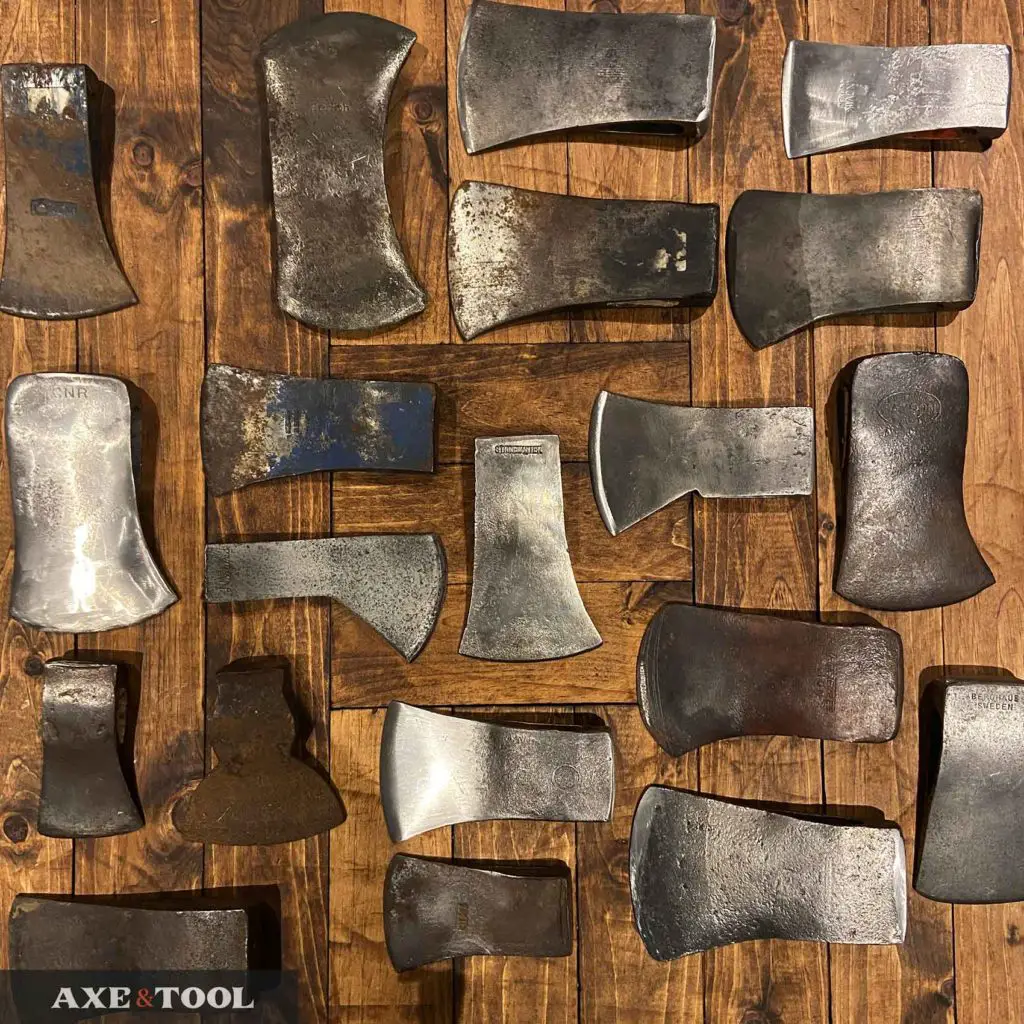
The hunt can be the best part of axe restoration and collecting.
Anyone who collects axes has stories of exciting finds and the axe that got away. It may take years for you to find a specific make and model, but you need to see what shows up and speaks to you along the way.
There are axes out there you won’t know you want until you see them.
There are a handful of fairly reliable ways to find old axes, each with pros and cons.
The best overall way to find vintage axes:
I asked over 50 axe enthusiasts and found Flea markets are widely considered the best way to find vintage axes. They are a regular source where you can find real bargains. However, prices are going up and flea markets aren’t always available.
The easiest way to find a vintage axe:
eBay is the easiest way to get a vintage axe. There is always a wide range of axes on eBay, many available with a “Buy it now” option. They tend to cost more and you need to pay for shipping BUT you can buy them on your phone and they will come directly to your door.
The cheapest way to get a vintage axe:
The best bargains will come from garage sales. People are clearing out their old junk and trying to sell to a small audience. It’s luck of the draw on whether you find one. So you are paying with your time and not money.
Finding vintage axes in a big city:
Online classifieds like Craigslist, Facebook Marketplace are the best way I have found to find old axes in a big city. They combine the quick search of online shopping, with in-person inspections and fast cash bargains.
While this is a “ranked” list, it can certainly change based on how you like to buy and the area you’re in. It may take some time to figure out which options work best for you, and it will usually be a combination.
1. Finding Axes at Flea Markets

Over 40% of the survey ranked flea markets as the #1 source for axes, and it was always in the top 3.
One of the biggest advantages to a flea market has nothing to do with actual axes. IT’S FUN. It’s much easier to justify you taking time to go hunt for axes over the weekend when it’s fun for the whole family. You can take your spouse or your kids, and make a routine of it!
While axes aren’t guaranteed, they tend to show up with fairly high frequency. Plus the markets are on a schedule, which makes it easy.
You can often find regular sources of axe heads at a good (or at least fair) price. Some sellers focus on buying and reselling old tools. They manage to get them in bulk from farmers or estate sales and bring them to the market.
Unfortunately, the prices have been going up for a while now. A lot of these sellers see the prices on eBay and price to match, so you won’t often find amazing bargains – but you can.
TIP: Lots of sellers are willing to negotiate prices. Don’t come in too low or you’ll just piss them off. I have found you get better results bargaining at the end of the season. The window for making a sale is closing and it saves them from having to deal with storage over winter.
The general booths that have no real specialty are where you can find better deals. The sellers have less experience with axes specifically.
However, there are a couple of frustrating things I’ve found about some less experienced axe sellers (usually older fellas).
They will paint the axe heads and possibly do a rough “sharpen” on a grinder and think this somehow makes them MORE valuable as a tool.
Trust me – they don’t want to hear how it’s less appealing because you have to remove the paint and file out their shitty grinder edge. They added “value”.
Handles can also make the price higher. Even if it’s loose, cracked, and wrapped in tape, it’s now a “usable tool” and so it is also “worth more”.
| Pros: | Cons: |
|---|---|
| Chance of good prices | No guarantees |
| Regular sellers | May be seasonal / limited |
| Fun to search |
2. Garage Sale Axes
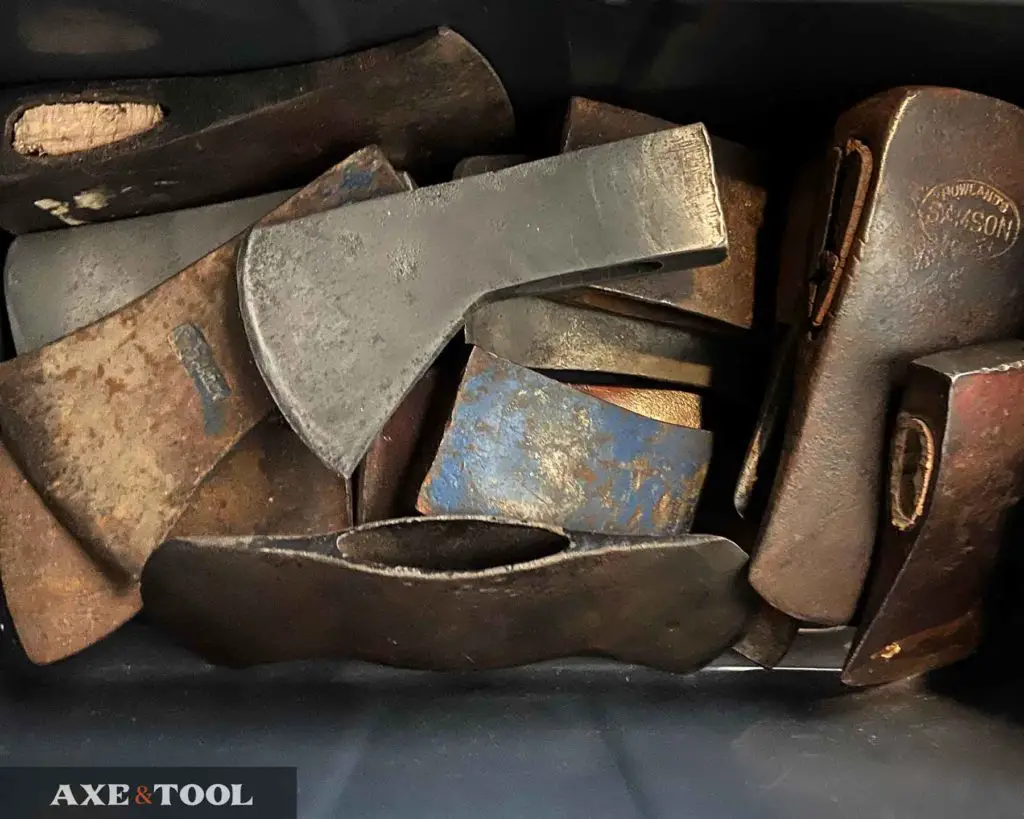
Garage sales have a lot of the same benefits and attributes of a flea market, but with a lot less certainty. It’s luck of the draw.
If you DO find an axe they are usually a great deal – lots of stories of $1 rusted heads found in buckets of junk. I’ve never been quite that lucky, but I got a few great $5 scores.
I don’t rely on garage sales because it’s just not a good use of time. It’s far from certain you will find one at all, and you will likely spend a lot of time in the pursuit.
But it never hurts to look if you come across a sale.
| Pros: | Cons: |
|---|---|
| Lowest prices | No guarantees |
| Fun family outing | Often no results |
| Fun to search | No fixed time/place |
3. Finding Axes on eBay
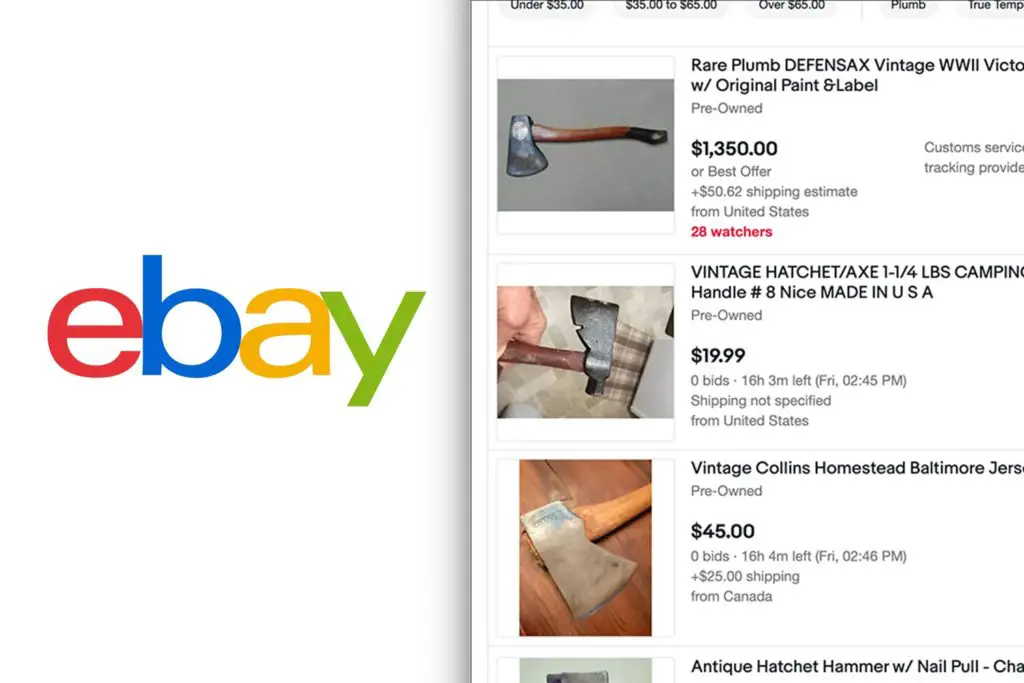
This is without a doubt the easiest way to get a vintage axe head, especially if you are just looking for a single axe to work on. You can find one with your phone and it arrives on your doorstep.
BUT you are likely going to pay a premium for it. The days of finding easy bargains on eBay are long gone. That’s not to say they don’t happen – I always keep an eye for good deals, but it’s become much harder to score over the last few years.
If you ARE looking for a rare or desirable axe, you can often find it on eBay. But you are paying the “global price”. So an axe you MIGHT find another way for $20, could cost you $50, $75, $200… $800.
Especially if you get into a bidding war, people can justify spending more than they planned in the heat of the moment. It’s not to say some of these old axes aren’t worth the high price – it’s just a question of if you want to spend time or money.
You will regularly see “buy it now” prices of $100-$200 and higher (way higher). BUT just because they price it at $100 does not mean it is worth it.
Do your research.
A new trend I have seen is sellers offering discounts to those who view the posting. So click on any axe you might like, and check back in an hour or so to see if you have any messages. It will come in the form of an offer you can “accept”. I accepted an offer for 33% off the list price recently, but it’s usually more like 12-15%.
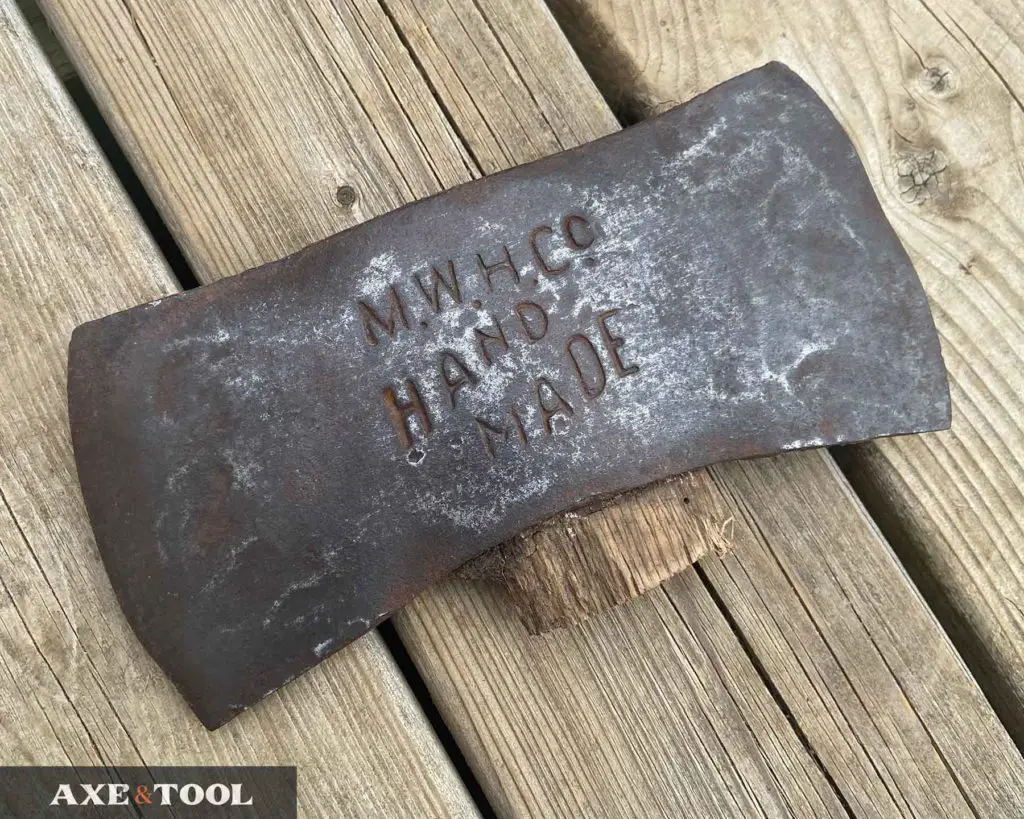
One trend I’ve noticed with axes, in particular, is that a lot of people tend to bid in the final hour. So even an axe that got NO bids over a week can jump suddenly to over $100. So it’s best to keep your bids until later in the auction and watch carefully.
TIP: I have had the greatest success winning auctions with a strategy called auction sniping. Bid within the last minute (usually last 10 sec) with your true max offer. This prevents panicking “losers” from adding a new higher bid and also prevents you from going out of your price range.
If you aren’t looking for anything in particular, you can find okay prices. Maybe $20-$30. But then you also have to add in another $10-30 for shipping. No free shipping here, it’s expensive to send large chunks of steel in the mail.
One unique option for eBay is that you can find axe heads from around the world. British, Finnish, or Australian axes don’t show up too often in North America. You just have to be willing to pay the shipping.
| Pros: | Cons: |
|---|---|
| Unlimited variety | Prices are generally high |
| “Buy it now” options | Lots of competition |
| Rare and desirable axes | Shipping is an added cost |
| Shipped to your door |
4. Online Classifieds
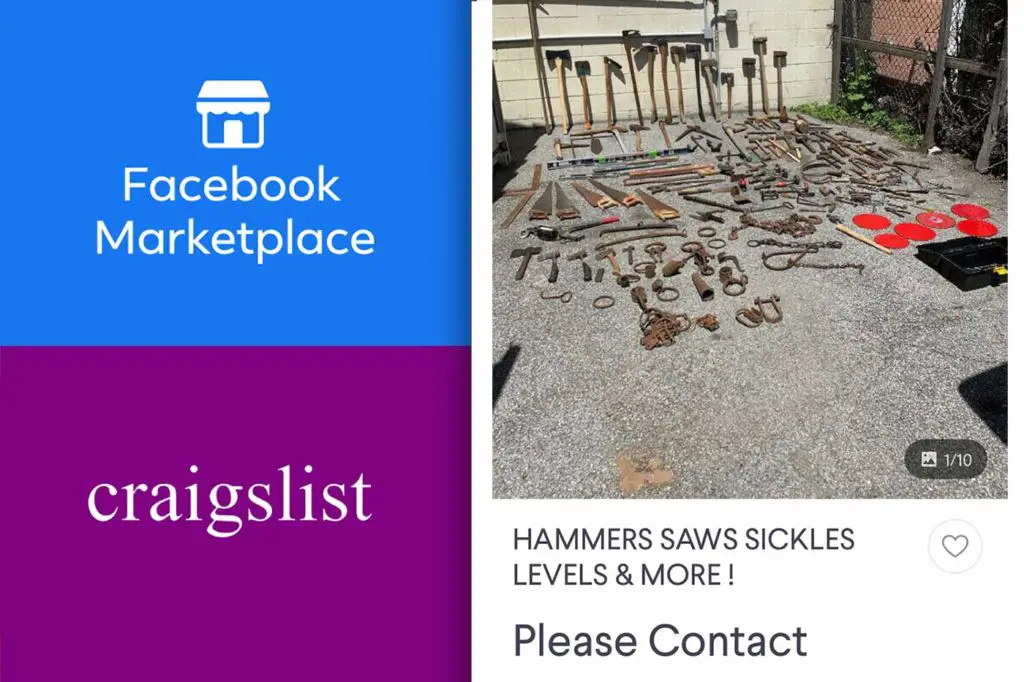
I was shocked how few people surveyed liked this method but it’s been one of my favorite and most successful ways to find axes for a long time now. It works best around a medium to large size city, but it could work anywhere.
You can search every day and it just takes a few minutes of your time. The big platforms all have their apps, or you can use your browser and check when you have a couple of minutes during the day (like when you are sitting on the toilet).
It’s easy to keep on top of too. It’s not going to be like eBay where there are hundreds of posts all over the world. It’s all local, with probably only a few new posts per day.
TIP: Once you find something – move fast. Sellers will usually honor the first “I’ll take it” while you sort out the details, but they won’t take the ad down until they have cash in hand. So don’t assume just because the ad is up that the item is still available.
Another HUGE advantage to online classifieds is that the people selling are generally trying to get rid of stuff as quickly as possible. They aren’t running a business, they just want to clear out some space and make a few bucks. This is one of the best ways to get a real bargain. I’ve got many great old axes for only $5-10, some in near original condition.
If you are lucky you might find some regular sellers as well. Typically scrappers, or people who manage to buy up lots of old tools to resell. The deals won’t be as good, but you are just competing with local buyers. So the prices should still be decent, especially if you buy in bulk.
TIP: If a seller has multiple axes they will often accept a lower price for the lot. What they lose in dollars they get back in time by only having to deal with one person. It won’t hurt to ask (if you are reasonable).
The final advantage is that you get a chance to see the axe in person before you hand over the cash. This is what makes this method different from any other online tool for buying axes.
The image quality online isn’t always great, so examine the axe and make sure there are no flaws/defects before you pay. It’s never too late to back out until you have handed over the cash.
TIP: Don’t rush – take a moment to examine the axe well. I have spotted rusted over maker’s marks the seller hadn’t seen and bought axes at a bargain, but I have also brought axes home with cracks I didn’t notice because I was in a rush.
I lived in a city with a frequent supply of new posting almost daily, but now only an hour away my area is a wasteland. Seasonality can also impact the number of axes on the market as well (think spring cleaning).
| Pros: | Cons: |
|---|---|
| Good bargains | Regional limitations |
| Easy to search anytime | Can be a waiting game |
| Examine before purchase |
5. Axes at Estate Sales
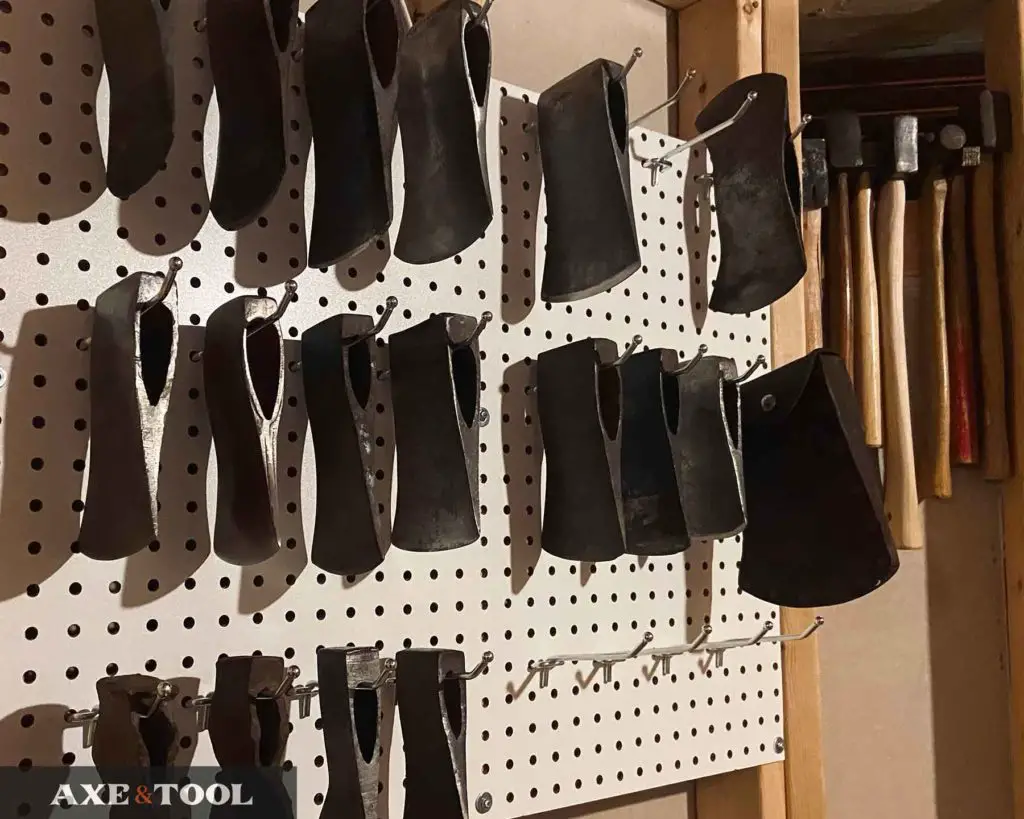
Estate sales can be a gold mine. I have seen piles of 70+ axes that get sold for less than $200. However, they can vary wildly in how they operate and the cost for axes.
Often items are grouped by lot, so there is a risk that you will need to buy a bunch of other things (often tools or camping gear) to win the axe you want. That will drive up the overall price and leave you in the position to deal with unwanted items.
Online Estate sales
There are lots of local estate sale websites that let you bid online – similar to eBay. You just need to find the right ones for your area. Just start googling. Some large national sites can link you to your local sites.
Unlike eBay however, you often need to pick up in person and at a specific time/day. So it’s not always as convenient as some of the other online sources, but it can more than make up for that in volume.
| Pros: | Cons: |
|---|---|
| Bargain opportunities | Less flexible timing |
| Easy online bidding | No in person inspection |
| Grouped “lots” with other stuff |
6. Local Auctions
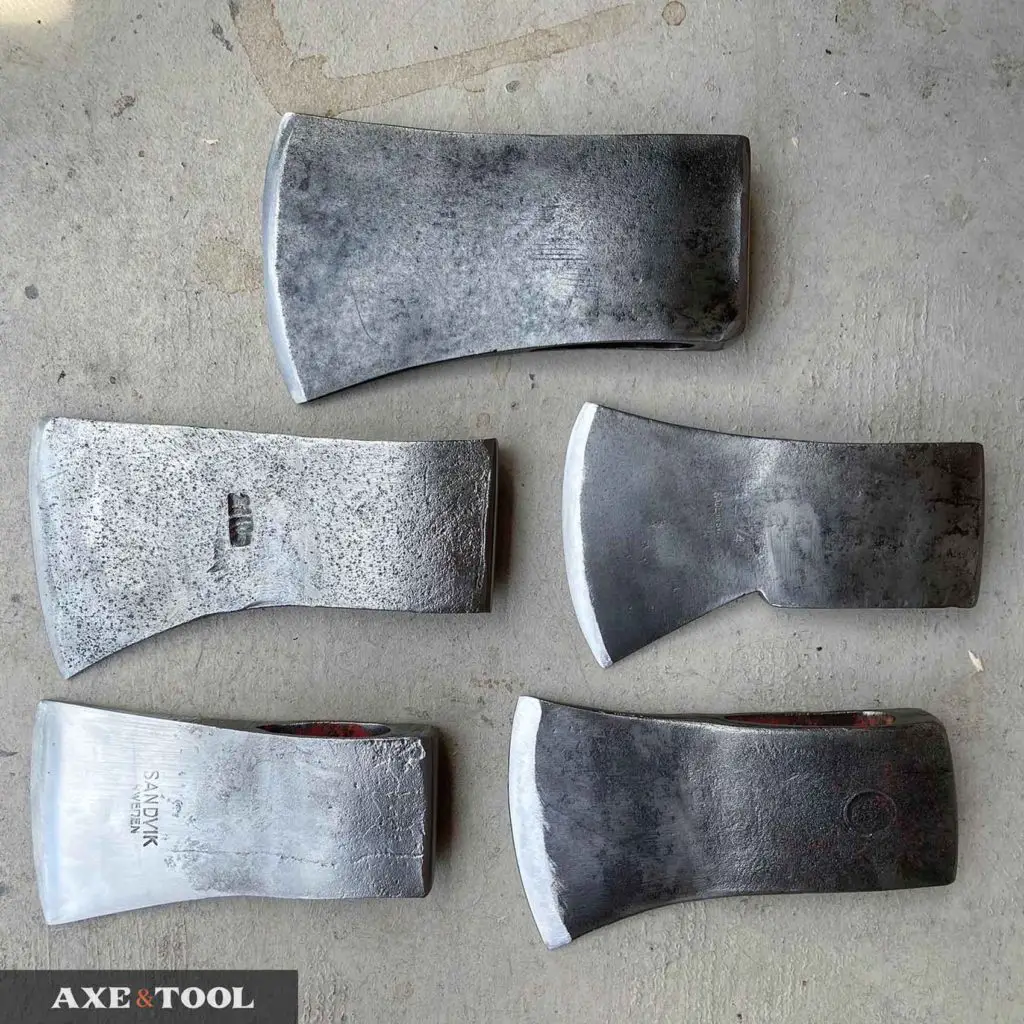
In-person auctions can be quite an experience but they are also a time commitment. It’s hard to tell what to expect because they are always different. You could see one or two axes or piles of them. You can luck out and be the only one interested, or the prices can jump high fast.
TIP: Items near the end tend to go for less – everyone has already spent their money.
One unique option that sometimes pops up is called “choice” or “buyers choice”. This doesn’t always happen, but it can with larger groups of times. If there are 10 axes and the highest bidder wins at $50, they can choose how many of the axes to buy for $50 each (1=$50, 2=$100, and so on). Then the bidding restarts at the bottom for the remaining pieces.
| Pros: | Cons: |
|---|---|
| Bargain opportunities | Less flexible timing |
| Online and in-person options | Time intensive (in person) |
| Inspection of items (in person) | Grouped “lots” with other stuff |
7. Axes at Antique Stores
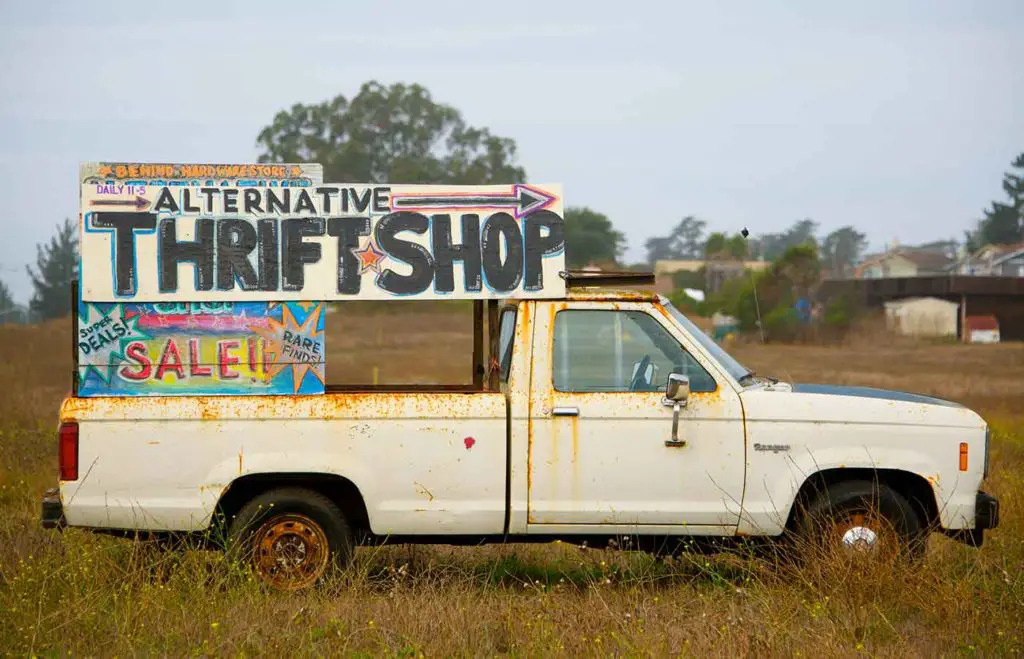
I consider antique stores the opposite of garage sales, they usually have an axe or two lying around – the problem is they are usually listed at “antique” prices. I have seen some pretty haggard old axes with a big price tag hanging on the wall.
Now you could get lucky and find an axe that is NOS (new old stock). It’s more likely here than elsewhere, but still quite rare.
Some more “casual” antique stores are closer in reality to a flea market, where there will be more tools and the prices are reasonable. You can usually tell pretty quickly what type of place you are in.
TIP: To save time in either type of store I always just ask immediately rather than looking around. You never know if they have been stuck in an old umbrella stand, or behind a desk – and you save a bunch of time if they don’t have any.
Unfortunately, most antique stores don’t have much of an online presence. It’s just too much hassle for them to bother putting their inventory online. This is still very much an old-world business.
One exception is the great online store at Jimbodetools.com. Jim specializes in antique tools and has an amazing selection which you can order online. The inventory also updates regularly. Go here if you want to see what a $3000 axe head looks like (don’t worry he has much cheaper options too).
Note: I have never bought from this site, but I know Jim has a reputation in the antique tool community.
| Pros: | Cons: |
|---|---|
| Availability | Often expensive |
| NOS (new old stock) potential | Typically in person only |
| Available all year | Hit or miss |
8. Axes on Etsy
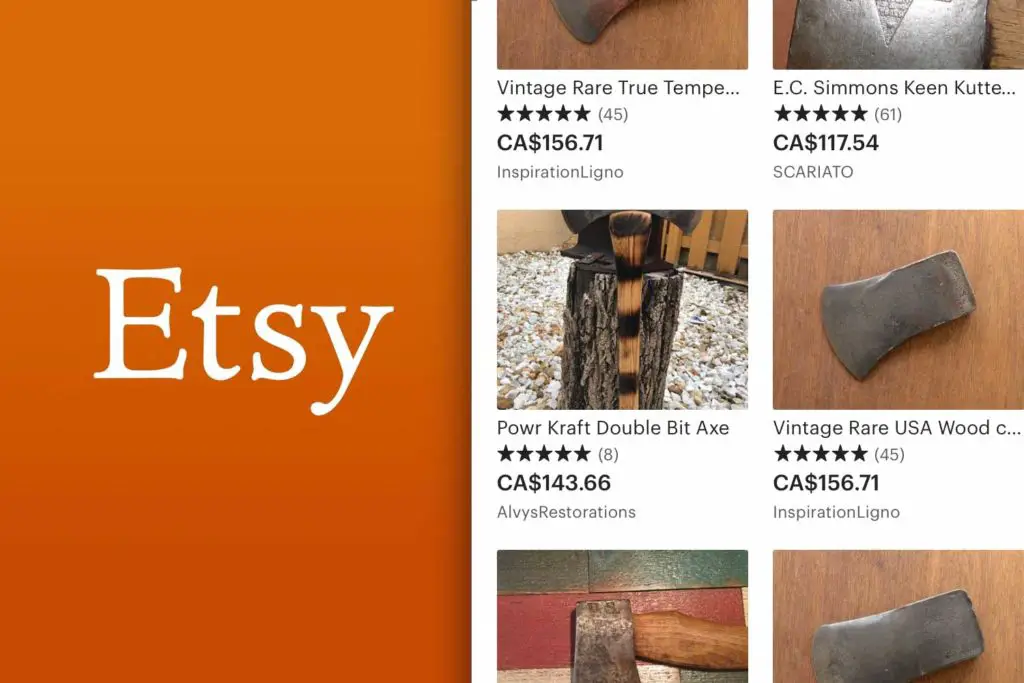
Etsy would be my last choice. I rarely look. It works similarly to eBay except there are fewer available and they tend to cost more. It’s only purchasing and not bidding which is simpler, but that also means no chance for deals. Not ideal but it is an option.
More axes have already had the “restoration” work done to them (with mixed results), so you will end up paying more for the “work” you wanted to do anyway.
There are some beautiful sheath makers on Etsy that are worth checking out. But I would go somewhere else for the axes themselves.
| Pros: | Cons: |
|---|---|
| Lower competition | Expensive |
| Buy it now | Limited options |
| Often already “restored” |
9. Social Networking
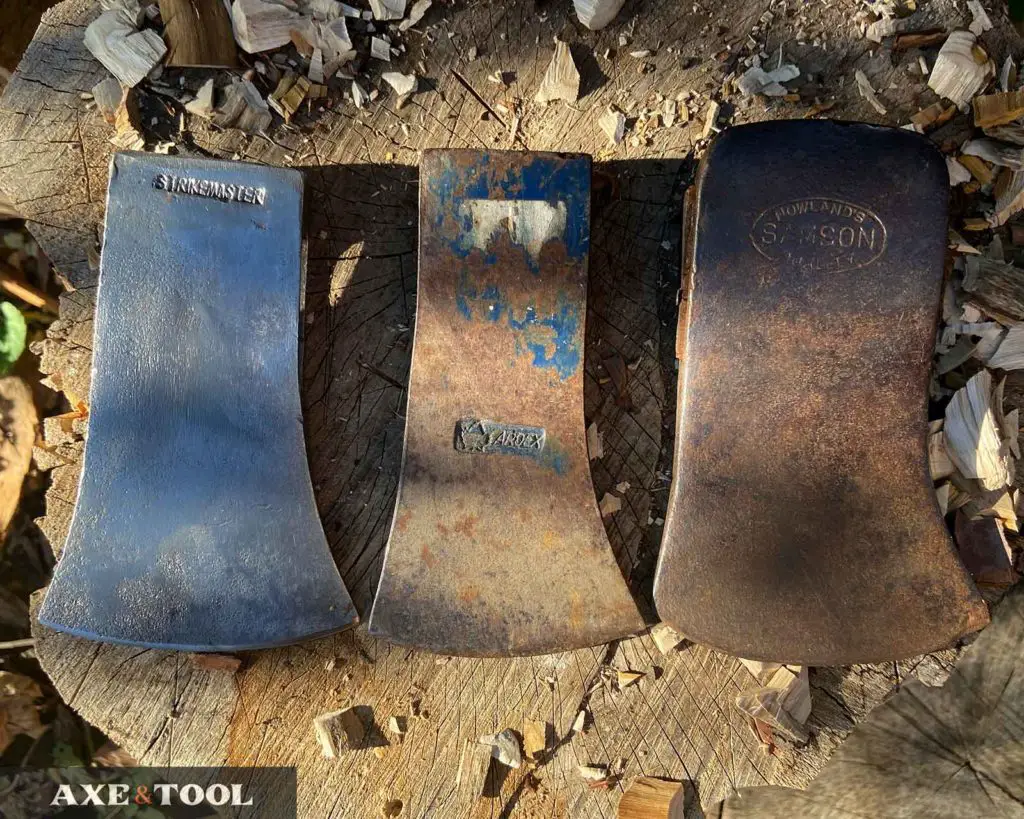
I know what you’re thinking, how is social networking a part of axe finding?
The more eyes looking, the more axes will be found.
I’m not saying recruit people just to help you find axes, but tell your friends and family you’re interested. Let people know about your hobby and see what turns up. I’ve got a few of my favorites this way (thanks Dad).
. Maybe a friend finds an old axe cleaning out their parent’s shed, or goes to a flea market and finds a $5 axe.
So get out there and talk about axes and it’ll pay off dividends in the long run.
Additionally, there are actually social groups on Facebook as well. Axe Junkies and Axe Hounds are two groups that have a fairly decent user base and often have people trying to trade or sell what they have. They even set up at swap meets throughout the year. This can be a great way to find cool pieces and just learn more about axes in general.
| Pros: | Cons: |
|---|---|
| Surprise axes | None? |
| More opportunities | |
| Meet other axe people |
Conclusion
Look around your area, see what is available. It might take some time to figure out what the best solutions are for you in your area. But hopefully, You now have an idea of how to get started.
Please comment below If I missed something or if you have any questions. I do my best to respond to everyone.
About the author:
About the author:
Jim Bell | Site Creator
I’m just a guy who likes axes. I got tired of only finding crap websites, so I set out to build a better one myself.
I’m also on Instagram: @axeandtool


Scrap yard and recycling centers. I have had mixed results, but it may be worth your while checking with the main office. Get to the point and politely ask if they have old axes in any condition, with or without a handle, that you could purchase by the pound. You likely won’t be allowed to search through various piles yourself for litigation and safety reasons. One place I found had a phenomenal broad axe lying on a stool. I asked about it and I was told they had already promised it to someone. I groaned, but I still regularly remind them that I’m interested if any other axes show up. Hey: you never know!
Thanks for the idea – I will have to add that to the list. I have got a couple random heads over the years from buddies who are scrappers, but it never occurred to me to hit the scrap yard itself.
Good morning.
Congratulations for the site, wonderful, learning a lot with you.
Thanks for sharing your knowledge and experience.
I am also passionate about axes and hatchets.
I’m from Brazil, quality material is very difficult here, both in literature and the axes themselves.
Could you produce an article or tell me something about the box axes, like the brigdeport tomahawk #99? History, origin.
Thanks.
If you can send me a few photos I can do a little digging and add an article. My email is contact@axeandtool.com
E-mail sent.